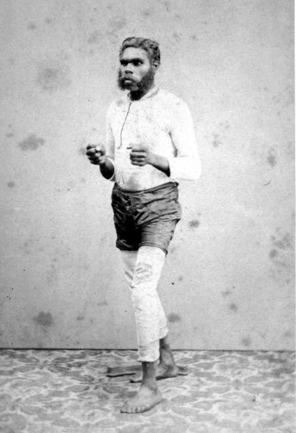
- Inducted:
- 2022
Albert Austin, known as Pompey and Poorne Yarriworri, was a Djab Wurrung man. He was born on 1 January 1846 at Chatsworth in western Victoria.
His story remained untold until published in Albert 'Pompey' Austin: A Man Between Two Worlds, by Roy Hay in 2020. The book outlines Pompey’s life and his amazing achievements as one of the greatest sporting all-rounders of 19th century Victoria.
Pompey’s parents, Charlie and Alice, are two ancestors of the Eastern Maar, Traditional Owners for much of south-western Victoria[1]. Alice was married to an Aboriginal man who was given the name Gellibrand. Newspaper reports and letters identified Gellibrand as Pompey’s father.
In his book, Hayes notes “We have no birth certificate for Pompey… born in the mid-1840s he must have just missed the peak of the invasion of the Western District of Victoria and the killing that occurred in the previous decade—but only just.”
Pompey grew up only a few years after Europeans arrived in western Victoria and the First Peoples fought hard to retain their country. Gellibrand was said to have been killed in a tribal conflict. Between 1834 and 1850, survivors were caught in a maelstrom in which they had been deprived of their land, country and hence their livelihood.
Pompey was held on Framlingham Mission in western Victoria under the dictates of the Aboriginal Protection Act 1869 (Vic). He was roughly 21 when he married Rosanna Francis in 1867, they each signed their marriage certificate with an ‘x’. They had five children.
Pompey died from tuberculosis on 7 June 1889 in a Melbourne hospital, his age given as 40 years. Rosanna and their two daughters were still living at Framlingham when the station closed in 1890.
An icon in his community, his impact is felt from Victoria across to the Kimberley region of Western Australia.
Pompey travelled all over south and central Victoria playing football, running and entertaining.
He worked in the Kimberley with explorer William J. O'Donnell leading gold seekers from Wyndham to the emerging goldfields at Halls Creek. A landmark near Halls Creek is known as Pompey’s Pillar.
He was a skilled Aboriginal tracker, horseman and horse breaker, footballer, cricketer and athlete. He was also possibly a boxer, racehorse owner and jockey, artist, explorer, entertainer and musician. He was certainly a thorn in the side of those who wished to confine him.
The first, and almost certainly the only, Aboriginal man to play senior Australian Rules Football in Victoria in the 19th century, he played—without boots—for the Geelong Football Club on 25 May 1872 against Carlton Football Club. He also played in teams for the Framlingham Mission.
Known for his athletic pedestrianism, a 19th-century form of competitive walking, he took the athletic world by storm by winning a series of meetings in the western districts. At the 1872 Geelong Friendly Societies Easter Gift races, on Easter Monday, Pompey won the Ten Pounds Grand Easter Gift. His victories at the meet included first places for the 100, 300 and 400 yards flat races, and also the 300 yards hurdles.
In his book, Hayes notes:
“He was a superb all-round athlete on the flat, over hurdles and in long and high jumps. He took part in the Warrnambool Cricket Club’s Annual Sports on the Prince of Wales’ birthday in November 1869, winning the high jump, the pole vault and the 220 yards hurdles, but fell at the last hurdle in the steeplechase. The next year he won the running high leap and a handicap hurdle race at the Caledonian Society’s Gathering in Warrnambool.”
“Pompey Austin collected £43 in one day by winning the handicap hurdle, the steeplechase and the Christmas handicap over 880 yards at the Belfast (now Port Fairy) Athletic Sports in December 1873. That was an extraordinary sum for someone who, as far as we know, had no regular income’, equivalent to approximately 11 weeks' wages.”
“Throughout his life Pompey Austin must have alternated between absolute poverty and what for the time would have been substantial riches, if he was able to gain and hold his winnings from his athletic activities in particular.”
Author Mary Durack wrote about him in Kings in Grass Castles (1959), referring to “the prodigious Pompey who sang popular songs hot from the London music halls”. Other reports have him entertaining crowds in Ararat playing a concertina and in Ballarat occupying a street corner and informing the crowd of “disquisitions on the present European situation and the probabilities of war”.
Pompey became a well-known public figure in Ararat, Ballarat, Geelong and Melbourne. He was reported being in Barkley Street, Ararat one Saturday evening playing tunes on a concertina: “Pompey’s musical proficiency was a surprise to a great many, as he discoursed several lively airs, principally consisting of breakdowns, jigs and reels in excellent time and in a manner that would have done credit to many an amateur…”
Pompey straddled two very different worlds as they collided in mid-19th century Victoria, where the impact was devastating. “His response was to take on the white man literally at their own games and at their own cultural activities and demonstrate by his prowess that he could match them in both.”
Today, the Austin family has the deepest respect and affection for their ancestor known as Pompey Austin.
Updated

